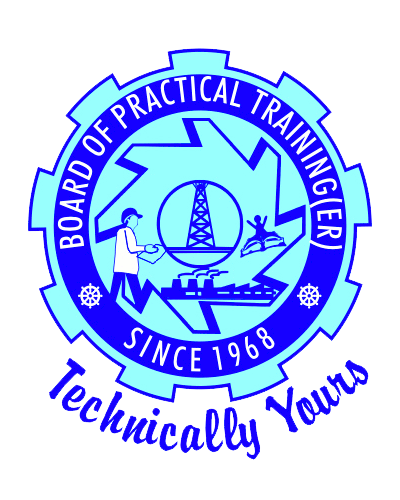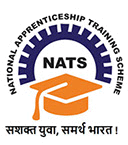
व्यावहारिक प्रशिक्षण बोर्ड (पूर्वी क्षेत्र)
BOARD OF PRACTICAL TRAINING (EASTERN REGION)
Ministry of Education
Government of India







 ➤ Mobilization of students to fill-up vacant slots notified under NATS.(Click here)
➤ Mobilization of students to fill-up vacant slots notified under NATS.(Click here)
 ➤ Uploading of RoP for Establishments for Generation of Certificate of Proficiency (CoP) for
Apprentices in NATS 2.0 portal.(Click here)
➤ Uploading of RoP for Establishments for Generation of Certificate of Proficiency (CoP) for
Apprentices in NATS 2.0 portal.(Click here)
 ➤ Detail Notice for NATS Aspirants.(Click here)
➤ Detail Notice for NATS Aspirants.(Click here)
 ➤ Establishments invited to join the NATS initiative for Apprenticeship Creditisation.(Click here)
➤ Establishments invited to join the NATS initiative for Apprenticeship Creditisation.(Click here)
 ➤ Students, enroll/register on the NATS Creditisation portal.(Click here)
➤ Students, enroll/register on the NATS Creditisation portal.(Click here)
 ➤ Explore the approved job roles for Creditisation under NATS.(Click here)
➤ Explore the approved job roles for Creditisation under NATS.(Click here)

Home Apprenticeship Engineering
Note:The information provided under this heading are for easy understanding of stakeholders. All care have taken to ensure that the content herein is as per the provisions of the Apprentices Act as amended in 2014, however, in case of any dispute the provisions of the said Act will prevail over these content.
List of Industry Sectors (Based on the nature of business who have registered in the NATS ) are:
The National Apprenticeship Training Scheme (NATS) is implemented under the provisions of Apprentices Act 1961 by Ministry of Human Resource Development, Govt. of India. NATS is one year paid On Job Training (OJT) scheme for fresh pass outs of Degree in Engineering and Diploma in Engineering to make them more employable by improving their practical knowledge and skills required in their field of work. The Apprentices get opportunity to undergo Apprenticeship training in reputed Central Govt., State Govt. and Private organizations having excellent training facilities. The Trainees of this OJT are called as Apprentices. The Training Establishments provide OJT to the Apprentices in their Factory or work place. Trainers/ Supervisors with approved training modules ensure that Apprentices learn the job more effectively. During the period of Apprenticeship Training stipend is paid to Apprentices. The Govt. of India prescribes the minimum rate of stipend, however, establishments are free to pay Stipend over and above the minimum prescribed rates. Govt. of India reimburses 50% on the minimum prescribed rate of Stipend, to the establishment on quarterly basis for all Apprentices whose contracts are registered with this Board. On successful completion of training a Certificate of Proficiency is issued to Apprentices by Government of India which is considered to be equivalent to One year Experience.
Ministry of Human Resource Development, Government of India, Department of Secondary Education & Higher Education has established four Regional Boards/ Board of Practical Training in the country to implement the Apprenticeship Training Scheme for Engineering / Diploma pursuing students.
| Eastern Region : Kolkata | Southern Region: Chennai | Northern Region: Kanpur | Western Region : Mumbai |
|---|---|---|---|
| Nagaland | Tamil Nadu | Delhi | Chattisgarh |
| Sikkim | Telangana | Haryana | Maharashtra |
| Orissa | Andhra Pradesh | Himachal Pradesh | Madhya Pradesh |
| Mizoram | Karnataka | Uttar Pradesh | Gujarat |
| Manipur | Kerala | Jammu & Kashmir | Goa |
| Jharkhand | Puducherry | Punjab | Daman Diu & Dadra Nagar Haveli |
| Bihar | Lakshadweep | Rajasthan | |
| Assam | Uttarakhand | ||
| Andaman & Nicobar Islands | Chandigarh | ||
| Arunachal Pradesh | |||
| Meghalaya | |||
| Tripura | |||
| West Bengal | |||
|
Contact Details:
Director & Regional Central Apprenticeship Adviser Board of Practical Training (ER) Ministry of Education, Government of India, Block-EA, Sector-I, Salt Lake City, (Opp. To Labony Estate), Kolkata – 700064 Phone 033-2337 0750/ 2337 0751 Email:inf@bopter.gov.in Website: www.bopter.gov.in Portal: www.nats.education.gov.in |
Contact Details:
Director & Regional Central Apprenticeship Adviser Board of Apprenticeship Training (SR), Ministry of Education, Government of India, CIT Campus, Taramani, Chennai-600 113 Phone 044-2254 2236 /2254 2703 Email:boatsr@vsnl.net Website: boat-srp.com Portal: www.nats.education.gov.in |
Contact Details:
Director & Regional Central Apprenticeship Adviser Board of Apprenticeship Training (NR) Ministry of Education, Government of India, Plot No.16, Block-I Lakhanpur, G.T.Road, Kanpur-208 024 Phone 0512-2584056 /2584057 Email: admin@boatnr.org batnorth@dataone.in Website: www.boatnr.org Portal: www.nats.education.gov.in |
Contact Details:
Director & Regional Central Apprenticeship Adviser Board of Apprenticeship Training (WR) Ministry of Education Government of India, 2 nd Floor, Administrative building, ATI Campus, V.N. Purav Marg, Sion, Mumbai-400022 Phone 022-24055635/24053682, Email:director.boatwr@gmail.com Website www.apprentice-engineer.com Portal: www.nats.education.gov.in |
A person shall be eligible for being engaged as Graduate/Technician if he/she satisfies one of the minimum educational qualifications defined at Para No. 1 provided that:
As per provisions of the Act, it is the responsibility of the employers to make the selection of apprentices as per notification. The selection is to be made from the candidates who fulfil the minimum standard educational qualification and medical fitness for undergoing the apprenticeship training under the Act.
The facility for apprenticeship training under the Act is available in the Subject Field approved by Central Apprenticeship Council of Govt. of India.
As per norms followed, the employers make the selection of apprentices. They can complete the selection process by preparing list directly from the student data base from the National Web portal (www.nats.education.gov.in) through log-in with their user id and password (generating panel of students online). In addition to this, they may also consider the list obtained from the following sources-
1. Reservation of training places of Scheduled Caste and Scheduled Tribes should be made as per ratio given below:-
| Sl. No. | Name of States | Ratio of SC Apprentices to the total apprentices | Ratio of ST Apprentices to the total apprentices |
|---|---|---|---|
| 1 | Assam | 1:15 | 1:9 |
| 2 | Bihar | 1:7 | 1:100 |
| 3 | Manipur | 1:33 | 1:3 |
| 4 | Meghalaya | -- | 1:2 |
| 5 | Nagaland | -- | 1:2 |
| 6 | Odisha | 1:7 | 1:4 |
| 7 | Tripura | 1:6 | 1:3 |
| 8 | West Bengal | 1:5 | 1:20 |
| 9 | Andaman & Nicobar Islands | -- | 1:13 |
| 10 | Arunachal Pradesh | -- | 1:2 |
| 11 | Mizoram | -- | 1:2 |
| 12 | Jharkhand | 1:9 | 1:4 |
| 13 | Sikkim | 1:20 | 1:5 |
When the prescribed number of persons belonging either to the Scheduled Castes or to the Scheduled Tribes are not available, the training places so reserved for them may be filled up by persons belonging to Schedules Tribes or, as the case may be, to the Scheduled Castes and if the prescribed training places cannot be filled even in the above manner, then the training places so lying unfilled may be filled up by persons not belonging to the Scheduled Caste or Scheduled Tribe.
2. The training places for the Other Backward Classes in designated trades shall be reserved by the employer according to the prescribed norms followed in the respective State or Union territory and if training places cannot be filled from the Other Backward Classes, then the training places so lying unfilled may be filled by persons not belonging to the Other Backward Classes.
As per provisions of The Apprentices Act, 1961 as amended in 1973; 1986 & 2014, it is a statutory obligation on the part of every employer (State and Central Govt. Department/Undertakings/Autonomous organizations and Private organizations) to engage prescribed number of Degree/Diploma holders in Engineering/Technology and Vocational Certificate holders in designated trade as Graduate/Technician/Technician (Vocational) apprentices respectively. The number of such apprentices to be engaged by an employer shall be prescribed by BOPT-ER Kolkata.
The Contract of Apprenticeship (Form F3 & F4) / online created through National Web portal duly filled in and signed and sealed at specified place by the employer/apprentices (or his guardian in case of minor) and surety, shall be submitted / uploaded online (www.nats.education.gov.in) by the employer in compliance of The Apprentices Act, 1961 as amended in 1973, 1986 & 2014 every year to BOPT-ER Kolkata within a stipulated time from the date of signing of Contract to BOPT-ER Kolkata for registration.
However, for the ease of doing e-business, it is desirable that the employer shall submit the Contracts of Apprenticeship immediately after commencement of the training through online mode (within 10 days of commencement of training) so that registration of Contract of Apprenticeship is done by BOPT-ER Kolkata at an early date.
Before registration of the Contract of Apprenticeship, BOPT-ER Kolkata shall verify the particulars provided by the apprentice and employer in the Contract of Apprenticeship Form. Subject to fulfilment of the provisions mentioned under the Act, the Contract of Apprenticeship shall be considered for registration by BOPT-ER Kolkata. After registration, a registration number shall be allotted against each apprentices. The registration number shall be quoted by the employer in all future references in respect of the particular apprentice including at the time of raising bills for claiming 50% Central Govt. share of stipend on minimum prescribed rate. However, the Regional Central Apprenticeship Advisor or his nominee shall not register a Contract of Apprenticeship unless he is satisfied that the person(s) described as an apprentice in the Contract is qualified under the Act for being engaged as an apprentice. Further wherever needed the apprentice will provide a declaration (Form 8) that he/she did not undergo any training / job for a period of one year or more and also has not signed any Contract of Apprenticeship with other employer under the Act in the past.
It shall not be obligatory on the part of the employer to offer any employment to the apprentice on completion of period of apprenticeship training in his establishment nor shall it be obligatory on the part of the apprentice to accept an employment under the employer.
Note: If, however, there is a condition in the contract of apprenticeship that the apprentices shall, after the successful completion of training serve the employer, shall on such completion be bound to offer suitable employment to the apprentice and the apprentice shall be bound to serve the employer in that capacity for such period and for such remuneration as may be specified in the contract, subject to the approval of the Regional Central Apprenticeship Advisor.
The employer shall ensure the maintenance of the record of the work done and the studies undertaken by the Graduate/Technician apprentices engaged in the establishment for each quarter.
The apprentice shall also maintain a record of work done during the period of his apprenticeship training.
Every employer shall ensure that the training is provided to the apprentices as per the program approved by the Regional Central Apprenticeship Advisor in line with the policies of Central Govt. framed from time to time. Employers shall also ensure that requisite skill development takes place in the apprentices in each quarter during the period of training.
Every employer shall ensure that the assessment of the skill development is conducted as per the frequency formulated by the Central Govt. The model for assessment is provided by Regional Central Apprenticeship Advisor. The record of Assessment of Progress in respect of each apprentice subsequent to its assessment is to be sent / uploaded online on NATs portal by every employer. Changes and modifications in this regard shall be published time to time on the website(http://mhrdnats.gov.in) for information of all stake holders.
Without prejudice to the other provisions of this Act every employer shall have the following obligation in relation to an apprentice, namely:
Every Graduate and Technician apprentice undergoing apprenticeship training shall have the following obligations, namely:
The employer shall pay to every apprentices during the period of apprenticeship training such stipend at a rate not less than the prescribed minimum, rate, or the rate which was being paid by the employer on 1st January, 1970 to the category of apprentices under which such apprentice falls, whichever is higher, as may be specified in the contract of apprenticeship and the stipend so specified shall be paid at such intervals and subject to such conditions as may be prescribed.
The minimum rates of stipend payable to Graduates & Diploma apprentices are as under: (w.e.f. 1st April, 2021)
| Category | Prescribed minimum amount of Stipend | |
|---|---|---|
| Old Rate (w.e.f 23.12.2014) | Revised Rate (w.e.f 01.04.2021) | |
| Graduates Apprentices or Degree Apprentices or Degree in any Stream | Rs. 4984/- P.M | Rs. 9000/- P.M |
| Graduate Sandwich Apprentices(Sandwich course students from Degree institutes | Rs. 3542/- P.M | Rs. 8000/- P.M |
| Technician Apprentices or Diploma holder in any stream | Rs. 3542/- P.M | Rs. 8000/- P.M |
| Technician Sandwich Apprentices (Sandwich course students from Diploma institute) | Rs. 2890/- P.M | Rs. 7000/- P.M |
The claim should be preferred on quarterly basis in arrears i.e. the apprentices engaged under the Act are to be paid full amount of stipend by the employers in the first instance and a claim are raised later on quarterly basis. The quarters should be as follows:
| April to June | 1st Quarter |
| July to September | 2nd Quarter |
| October to December | 3rd Quarter |
| January to March | 4th Quarter |
Where any apprentices are undergoing training in a factory, the provisions of Chapters III, IV and V of the Factories Act, 1948, shall apply in relation to the health, safety and welfare of the apprentices as if they were workers within the meaning of that Act and when any apprentices are undergoing training in a mine, that provisions of Chapter V of the Mines Act, 1952, shall apply in relation to the health and safety of the apprentices as if they were persons employed in the mine.
If personal injury is caused to an apprentice, by accident arising out of and in the course of his training as an apprentice, his employer shall be liable to pay compensation which shall be determined and paid, so far as may be, in accordance with the provisions of the Workmen's Compensation Act, 1923, subject to the modifications specified in the Schedule.
In all matters of conduct and discipline, the apprentice shall be governed by the rules and regulations applicable to employees of the corresponding category in the establishment in which the apprentice is undergoing training.
Every Graduate Technician apprentice, who completes his/her apprenticeship training to the satisfaction of the concerned Regional Board shall be granted a “certificate of proficiency” by that Board on behalf of Central Govt. For the above purpose, every apprentice, who has successfully completed 12 months training shall be entitled to download/receive Certificate of Proficiency online/offline subject to the condition that his/her last quarter assessment is completed and uploaded / forwarded by the employer. However, the employer may issue a certificate to the apprentices of their own.
a)Where Graduate / Technician / Technical (Vocational) apprentice is unable to complete the period of Apprenticeship Training due to Strike / Lock-out / Lay-off in an establishment where he is undergoing training and is not instrumental in the same, the period of his apprenticeship training would be extended equal to the period of Strike / Lock-out / Lay-off and he shall be paid stipend during the period of such Strike / Lock-out / Lay-off or for a maximum period of six months whichever is less.
b)If the Strike / Lock-out / Lay-off is likely to continue for a longer period, the employer shall follow the procedure for novation of Contract of Apprenticeship for the apprentices referred to in 21(a) above with the other employer as specified in Section 5 of the Act.
Every apprentice should maintain a daily record of work done by him relating to the apprenticeship training in the form of a workshop or laboratory note-book.
If personal injury is caused to an apprentice by accident arising out of and in the course of his training as an apprentice, the employer shall be liable to pay compensation which shall be determined and paid, so far as may be in accordance with the provisions of the Workmen’s Compensation Act, 1923 (8 of 1923) subject to the modification specified in the schedule.
Every apprentice undergoing apprenticeship training in an establishment shall be a trainee and as such any provisions of the law with respect tolabour shall not apply to or in relation to such apprentice.